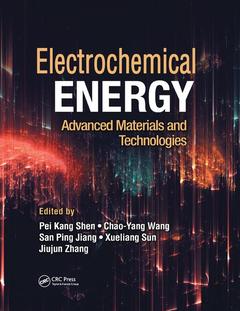Description
Electrochemical Energy
Advanced Materials and Technologies
Electrochemical Energy Storage and Conversion Series
Language: English
Keywords
Energy Density; Electrochemical Energy Storage and Conversion; Fuel Cell; Electrochemical Energy Materials and Technologies; Transition Metal; Catalyst Approaches; Lead Acid Batterie; Li-Ion Rechargeable Batteries; Li O2 Battery; Lithium-Ion Batteries; Flow Battery; Vehicle Electrification; Li Air Battery; Metal-Air Rechargeable Batteries; Water Electrolysis; Zn-Air Rechargeable Batteries; Proton Conductivity; Li-Air Rechargeable Batteries; Current Collector; Na-Air Batteries; Nafion Membrane; Lead-Acid Rechargeable Batteries; Negative Electrode; Lead-Acid Automotive Battery; LIBs; Solid Oxide Fuel Cells (SOFCs); Electric Vehicles; Polymer Electrolyte Membrane Fuel Cells; Lead Acid Batteries; Oxygen Reduction Non-PGM Electrocatalysts for PEM Fuel Cells; PFSA Membrane; Proton-Exchange Membrane Fuel Cells; Bipolar Plates; Supercapacitors; Cathode Materials; Liquid-Redox Flow Batteries; Air Electrode; Liquid-Redox Rechargeable Batteries; MEA; Water Electrolysis Producing Hydrogen; SOFC Stack; Anode Materials; Zinc Air Battery; Ionic Conductivity; Vanadium Ion
Publication date: 07-2017
· 21x28 cm · Paperback
Publication date: 02-2016
· 21x28 cm · Hardback
Description
/li>Contents
/li>Biography
/li>
Electrochemical Energy: Advanced Materials and Technologies covers the development of advanced materials and technologies for electrochemical energy conversion and storage. The book was created by participants of the International Conference on Electrochemical Materials and Technologies for Clean Sustainable Energy (ICES-2013) held in Guangzhou, China, and incorporates select papers presented at the conference.
More than 300 attendees from across the globe participated in ICES-2013 and gave presentations in six major themes:
- Fuel cells and hydrogen energy
- Lithium batteries and advanced secondary batteries
- Green energy for a clean environment
- Photo-Electrocatalysis
- Supercapacitors
- Electrochemical clean energy applications and markets
Comprised of eight sections, this book includes 25 chapters featuring highlights from the conference and covering every facet of synthesis, characterization, and performance evaluation of the advanced materials for electrochemical energy. It thoroughly describes electrochemical energy conversion and storage technologies such as batteries, fuel cells, supercapacitors, hydrogen generation, and their associated materials. The book contains a number of topics that include electrochemical processes, materials, components, assembly and manufacturing, and degradation mechanisms. It also addresses challenges related to cost and performance, provides varying perspectives, and emphasizes existing and emerging solutions.
The result of a conference encouraging enhanced research collaboration among members of the electrochemical energy community, Electrochemical Energy: Advanced Materials and Technologies is dedicated to the development of advanced materials and technologies for electrochemical energy conversion and storage and details the technologies, current achievements, and future directions in the field.
Overview of Electrochemical Energy Storage and Conversion. Advanced Materials and Technologies for Li-Ion Rechargeable Batteries. Advanced Materials and Technologies for Metal-Air Rechargeable Batteries. Advanced Materials and Technologies for Lead-Acid Rechargeable Batteries. Advanced Materials and Technologies for Fuel Cells. Advanced Materials and Technologies for Supercapacitors. Advanced Materials and Technologies for Liquid Redox Rechargeable Batteries. Advanced Materials and Technologies for Water Electrolysis Producing Hydrogen.
Pei Kang Shen obtained his BSc in electrochemistry at Xiamen University in 1982. He received his PhD in chemistry at Essex University in 1992. From then on, he has been working at Essex University, Hong Kong University, the City University of Hong Kong, and the South China University of Technology. Since 2001, he has served as a professor and director of Advanced Energy Materials Research Laboratory at the Sun Yat-sen University, Guangzhou, China. He is the author of more than 300 publications. His research interests include fuel cells and batteries, electrochemistry of nanomaterials and nanocomposite functional materials, and electrochemical engineering.
Chao-Yang Wang is William E. Diefenderfer Chair in mechanical engineering and distinguished professor of mechanical engineering, chemical engineering, and materials science and engineering at the Pennsylvania State University. He has been the founding director of Penn State Electrochemical Engine Center since 1997. Dr. Wang holds several patents and has published two books. He has more than 12,000 Science Citation Index citations, an h-index of 65 (Web of Science), and is one of 187 highly cited researchers in engineering named by Thomas Reuter in 2014. His research interests cover the transport, materials, manufacturing, and modeling aspects of batteries and fuel cells.
San Ping Jiang obtained his BEng in ceramic materials from South China University of Technology in 1982 and PhD in electrochemistry from The City University, London, in 1988. He is a professor at the Department of Chemical Engineering, deputy director of Fuels and Energy Technology Institute, Curtin University, Australia, and adjunct professor at University of the Sunshine Coast, Australia. Dr. Jiang has authored and coauthored 10 book chapters and three books, and published approximately 270 journal papers. His research interests encompass solid oxide fuel cells, proton-exchange membrane and direct alcohol f




